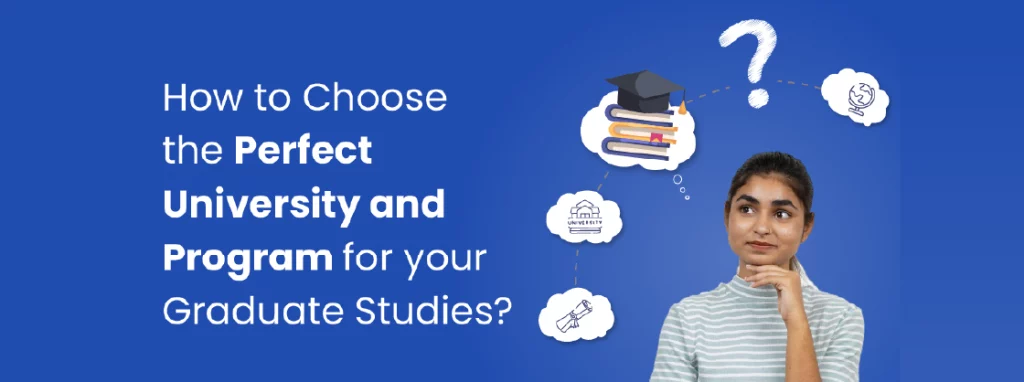Table of Contents
Path to choosing the right university and program for study abroad graduate prospects
Thousands of ambitious and successful undergrads are driven by one common pursuit, year on year: to acquire a master’s degree overseas. Pursuing graduate studies on an international platform provides undergrads with the opportunity to advance their existing learning at the highest level, as well as gain practical proficiency to make a promising career start on a global stage. If you are keen on transitioning the college-university- working environment route with an in-demand study abroad graduate degree then there are two things you need to do right: choosing the perfect university and the right program. Whether you are in the field of finance, computer science or architecture, the university and program selection that you make while pursuing your master’s degree will be life transforming in terms of your career advancement and quality of life.
Why Making the Right University and Program Choice is Crucial for a Study Abroad Graduate?
Pursuing a master’s degree will not only enable you to advance your knowledge in your passionate area of study, but also provide you with a pathway to transition between disciplines, if you intend to advance in a different field. Therefore, it is important to ensure that the choices you make are prudent and in line with your professional goals, career transition plans and long term ambitions like settling in the US, in case you decide to pursue your graduate studies in America.
This article attempts to provide time tested insights and strategies into university and program selection for aspiring graduates like you so that you are better prepared to start your study abroad journey on the right note.
Define your Goals
Before getting down to choosing the best university and program to apply to, there are a couple of things you must do: define a solid career plan and choose a destination
To begin with, you need to reflect on where you are and where you want to be. Understand what interests you the most in your field and have a clear roadmap of why you want to pursue a master’s degree in a foreign country. Define and review your short-term and long-term goals. Having a clear vision about your goals and interests will not only ease the process of university and program selection considerably but also help you make the right choice.
Choose the Country
The next thing you should do is choose the country. There are several factors you need to consider while choosing your study destination. Some of the important considerations include
- Job Prospects
Once you are clear about your goals, you can segregate destinations based on the job prospects they offer in your field of study. For example, if you choose to pursue data science as a career, then you should consider the US, as America is renowned for providing excellent job prospects to STEM graduates. On the other hand, if you wish to pursue traditional engineering fields like mechanical or chemical engineering, then you should consider Germany. Likewise, if you are an aspiring law graduate, then it would be advisable to consider the UK.
Also, some countries like France have a solid career support system in place for Indian students. Omnes Education, one of the leading higher education institutes in France, has an impressive network of 10,000 companies and 40,000 alumni, and is leading the career support initiative. You should explore such opportunities and possibilities before you finalize your study abroad destination. More importantly, you need to evaluate if you can work in the chosen destination after you graduate, and if so, for how long.
- Tuition Fees and Scholarships
Pursuing graduate studies abroad is generally considered expensive, especially in the big three destinations that Indian students normally prefer: the US, UK, and Canada. Financial aid may mean loans at some universities, so you should inquire about different means of funding and support such as scholarships, teaching assistantships, fellowships, and grants based on your program. You can also explore destinations that offer free education and scholarship opportunities.
While the US is quite expensive, most public universities in Germany are renowned for offering free education across various degrees. However, you will have to pay a nominal fee toward administrative costs if you plan to study at a public university in Germany. On the other hand, studying in Singapore can be relatively cheaper considering the system of employer-sponsored education. Under this system, known as the Service Obligation grant, you can seek an employer who can pay partly for your studies. However, you will have to work for the sponsoring employer for three years once you graduate.
The scope for scholarships may be limited if you plan to study in the US, whereas destinations like France, Germany, and other European countries are renowned for offering various scholarships from the renowned Erasmus to DAAD. In fact, the DAAD has been attracting study abroad aspirants from major cities across India over the last couple of years.
- Cost of Living
You need to factor in the living costs and expenses. You can calculate average essential monthly expenses across destinations to find a budget-friendly destination that offers quality education.
- Immigration Friendliness
One of the most challenging aspects of studying abroad today is getting a student visa. Most top-tier destinations are amending and tightening their visa regulations regularly due to political compulsions and economic considerations. As a result, you have to ensure that the country you choose is inviting and visa-friendly. It will be easier to get a visa in Singapore and Australia than in the US and Canada, given the prevailing geopolitical developments, economic situation, and inflation
Shortlist Universities
This section of the article guides you through the crucial process of shortlisting universities for your study abroad journey. While annual university rankings are commonly used, relying solely on rankings is inadequate. Multi-disciplinary universities may have varying rankings for different programs; a university highly ranked globally may not excel in the specific program you wish to pursue. Hence, prioritize program-specific rankings and ensure the university offers relevant, industry-aligned programs that meet your career aspirations.
To begin, refer to respected global university rankings such as QS World University Rankings, Times Higher Education Rankings, or US News (if applying to the US). Use these rankings to compile a list of approximately 20 universities, including private, public, and multi-disciplinary institutions, to gauge their reputation, academic rigor, and industry connections. While this process may be tedious, it’s essential to review GRE, TOEFL, and CGPA cut-offs for each university to assess your eligibility. Many universities set minimum scores for tests like GRE or GMAT, requiring you to adjust your search criteria. accordingly.
Start by seeking out peers or friends who have attended the universities you’re interested in. Connect with faculty members, current students, and alumni to gather insights into admission processes, program strengths, and career prospects. Utilize platforms like LinkedIn or alumni databases to reach out to alumni and compare their GRE, TOEFL, and CGPA scores. This research is crucial in improving your chances of admission.
Focus on the academic offerings rather than just rankings and aim to shortlist at least 10 universities that best align with your academic goals and career aspirations.
Choose Programs and Courses
Understand the various program offerings from your shortlisted universities. Review each program type in detail to ensure the curriculum meets current industry demands. Some universities offer shorter-duration degrees compared to full-time programs. Shortlist programs based on academic depth and value, considering options like thesis or non-thesis tracks. Choose programs with flexible course structures and electives that align with your interests and career goals. Aim for programs that span at least 1.5 to 2 years to allow for thorough learning, practical exposure, and internships. Inquire about capstone projects, optional practical training, and internship opportunities before finalizing your choice.
- Shortlisting programs can be challenging for pre-professional fields like law, medicine, and architecture. Consider degree recognition and additional certifications required for practicing in countries other than your study abroad destination.
- Examine program specializations to ensure they deepen your subject understanding and integrate practical skills necessary for your profession. For research programs, discuss ongoing research projects and potential areas of study with faculty members.
- Develop critical skills such as problem-solving, communication, and critical thinking, essential in today’s global work environment. Review professors’ academic achievements, research, and publications to match their expertise with your aspirations.
- Consider your industry readiness and post-graduation job prospects. Investigate university-industry collaborations and campus placement opportunities. Connect with alumni in similar programs to learn about job opportunities related to your intended field of study.
Categorize Your Options
1. Safe Schools: These are universities where you are highly likely to get admitted.
Criteria:
- Moderate to high acceptance rates
- Your academic profile matches or exceeds their admission criteria
- Generally lower competition compared to other categories
2. Moderately Competitive Schools: These universities have a moderate level of competition for admission.
Criteria:
- Balanced acceptance rates
- Your academic profile meets their average admission standards
- Some competitiveness but reasonable chances of acceptance
3. Competitive Schools: These are your top-choice universities with higher competition for admission.
Criteria:
- Lower acceptance rates
- Your academic profile aligns closely with their higher admission standards
- These schools are more selective and prestigious
Application Strategy:
- Aim to apply to a minimum of 6 universities, ideally 2 from each category.
- Ensure diversity in acceptance levels across your chosen universities to maximize your chances of acceptance.
- Have a default or first-choice school in mind, especially for competitive profiles, but maintain a balanced approach across all categories.
Choosing the right university and program is crucial for your success, not only in the program but also in empowering your present and building your future. With over two decades of counselling experience, we at Collegepond have the expertise to recommend the best among the finest universities and programs to our students by learning about their motivations, understanding their career goals, and assessing their unique profiles. Our efforts in this direction have shaped the future of thousands of study abroad aspirants so far.
If you are keen on identifying the right university and program, fill out the appointment form for a free evaluation. We can assist you in discovering the best educational options at the graduate level that align with your academic and professional goals.













